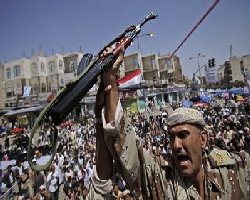Several military commanders, ambassadors and tribal chiefs in Yemen have made clear their support for pro-democracy protesters, ramping up pressure on Ali Abdullah Saleh, Yemen's president, to step down.
The developments led to tanks being deployed on Monday in the streets of Sanaa, the capital, creating a potentially explosive situation and prompting the defense minister to declare that the army still backed the president.
"The armed forces will stay faithful to the oath they gave before God, the nation and political leadership under the brother president Ali Abdullah Saleh," Mohammed Nasser Ahmed announced.
"We will not allow under any circumstances an attempt at a coup against democracy and constitutional legitimacy, or violation of the security of the nation and citizens."
Saleh's grip on power and his refusal to quit despite mounting pressure from pro-democracy protesters suffered a major blow with senior army officers and diplomats switching support to the demonstrators.
Major-General Ali Mohsen Al-Ahmar, the head of the north western military zone and the first armored division, announced his support for the protesters following a brutal crackdown on the protesters.
Other high-ranking officers that have defected include Brigadiers Hameed Al Koshebi, head of brigade 310 in the Omran area; Mohammed Ali Mohsen, who heads the eastern division and Nasser Eljahori, head of brigade 121.
General Ali Abdullaha Aliewa, an adviser to the Yemeni supreme leader of the army, also deserted the president.
Saleh's support in diplomatic circles also appeared to be vanishing, with Abdel-Wahhab Tawaf, Yemen's ambassador to Syria, saying he was stepping down and joining colleagues who have quit in protest.
Speaking from the Syrian capital, Damascus, Tawaf said he was resigning over dozens of Yemenis fatally shot by snipers on Friday near Sanaa University, for weeks the centre of demonstrations.
Yemen's ambassadors to Saudi Arabia, Lebanon, Egypt, the Arab League and China have also resigned or expressed support for the protest movement.
'Demand for change'
Huda al-Baan, Yemen's human rights minister, also resigned from the government and the ruling party in protest over Friday's attack.
Abdullah Alsaidi, Yemen's ambassador to the UN, told Al Jazeera: "I think there is now a demand for change and we are all for a peaceful change. I appeal to the president and to all the others to work for a peaceful transfer of power."
Speaking in Paris, Alain Juppe, the French foreign minister, said resignation for Saleh was "unavoidable" and pledged "support to all those that fight for democracy".
Hakim Al Masmari, editor-in-chief of Yemen Post, said the defections spell the end for Saleh.
"It is officially over, now that 60 per cent of the army is allied with the protesters," he told Al Jazeera.
"For Ali Mohsen Saleh to announce this, it is a clear sign to president Saleh that the game is over and that he must step down now."
Masmari, however, said Major-General al-Ahmar was not an acceptable figure to lead the country.
"Ali Mohsen Saleh will not be accepted by the youth ... He is also very corrupt; he is not respected here in Yemen."
The country's most powerful tribal confederation Hashed, which includes Saleh's tribe, issued a statement asking the president to respond to the people's demands and leave peacefully.
Barbara Bodine, a former US ambassador to Yemen, told Al Jazeera that a negotiated agreement could end the crisis.
"I think at this point there really does need to be some efforts for a negotiated agreement to move forward," she said.
"With the diplomatic resignations, cabinet resignations and demonstrations across the country, I think in its current configuration, the government can't survive.
"What is really an open question is whether or not there is any kind of negotiated agreement possible at this stage."
Saleh, who has been in power since 1978 and has pledged to step down at the end of his term in 2013, has no clear successor, one reason why his closest allies - the US - have appeared nervous about his stepping aside.
Genny Hill, who heads the UK's Chatham House Yemen forum, said having Saleh step down would likely be a blow to American policy in the region.
"The Americans have been backing military units under the command of the president's family for many years now and those relationships have been established in order to pursue America's own counter-terrorism objectives," she told Al Jazeera.
"The Americans essentially have all their eggs in one basket in Yemen at the moment... if President Saleh loses power in the coming days or weeks, all of those relationships are going to be jeopardized and the Americans will have to start from scratch."
PHOTO CAPTION
Yemeni army officer reacts holding up his AK-47 as he and other officers join anti-government protestors demanding the resignation of Yemeni President Ali Abdullah Saleh, in Sanaa,Yemen, Monday, March 21, 2011.
Al-Jazeera


 Home
Home Discover Islam
Discover Islam Quran Recitations
Quran Recitations Lectures
Lectures
 Fatwa
Fatwa Articles
Articles Fiqh
Fiqh E-Books
E-Books Boys & Girls
Boys & Girls  Ramadan
Ramadan Fatwa Audios
Fatwa Audios Month of Mercy
Month of Mercy Women
Women Eed Al- Fitr
Eed Al- Fitr Food Recipes
Food Recipes Videos
Videos

 Prayer Times
Prayer Times












